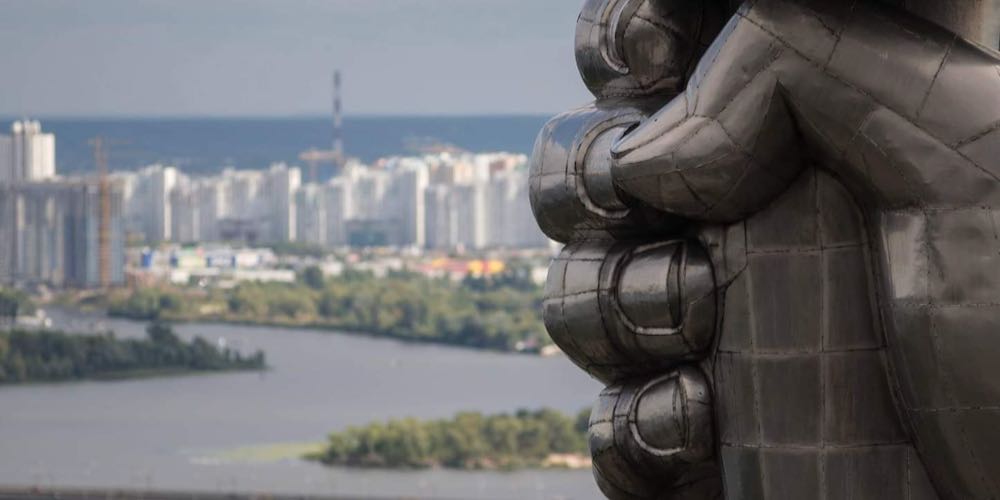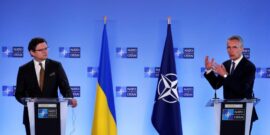Return to the Bloodlands
It is easier to start a war than to end one on favorable or even acceptable terms. Those who start wars seek to enrich themselves and impoverish their enemies, as Niccolò Machiavelli pointed out, but some victories are Pyrrhic, draining resources or acquiring territories that only weaken the aggressor’s position. Vladimir Putin’s invasion of Ukraine shows that dynamic at work. How the conflict will end remains unclear, but we can already see wide effects in the disruption of trade and financial markets. War on a scale not seen in Europe since 1945 has inflicted political shocks that will be hard to contain, especially with blanket media coverage highlighting civilian casualties and destruction. Competing narratives are shaped by propaganda and spin on both sides, and it can be difficult to comprehend rapidly moving events. Even reliable accounts on the ground capture only part of a larger story.
Putin presumably expected the invasion would bolster Russia’s resources and his own domestic prestige, as other recent offensives had done. Recent experience provided him a guide that has turned out to be a bad map for the present. As the invasion proves more costly and difficult than anticipated, Putin now faces a grim set of options. It will be increasingly difficult to achieve significant victories to secure clear political outcomes. At the same time, withdrawal means a humiliation for Russia that threatens his own tenure.
The Jewel of Kiev
A shift in geographical perspective that locates Ukraine firmly within Europe, not at its periphery, sets important context for understanding the war. Regardless of the actual map, cultural boundaries have varied depending on how we think about the developed European World. A helpful example is the Cold War split between East and West that relegated much of Central Europe to the former. Once the Iron Curtain fell, that distinction faded. The European Union and NATO provided overlapping alternative institutional definitions of Europe, and joining either or both was desirable for post-Communist states as a step into the sphere of developed, democratic nations.
Russia has drawn attention to NATO expansion, but EU membership or some variant partnership had a greater impact. It provided development aid and facilitated direct foreign investment, including from the United State and other countries outside the EU, along with access to consumer goods and markets. Rising living standards in post-Communist states like Poland and Romania that joined institutional Europe made that path all the more attractive to former Soviet counterparts. The United States and other western governments encouraged these hopes as part of a competition with Russia for influence.
Russia, however, especially craves influence over Ukraine which it considers within its own sphere. Ukraine’s resources and location on the Black Sea make it strategically pivotal. From the 18th century through World War I, those assets underpinned Imperial Russia’s position as a great power. The later struggle for control between the Soviet Union and Nazi Germany made the extended region what Timothy Snyder called Europe’s Bloodlands.
Vladimir Putin sees Ukraine and Belarus as part of Russia, viewing the loss of territories in 1991 amidst the Soviet collapse as a tragedy to be overcome. Recovering Ukraine would bolster his legacy, and advance his larger ambition of rebuilding greater Rus, but divisions within Ukraine work against it. The Habsburgs and Poland ruled the nation’s western regions, which became the cradle of Ukrainian nationalism. Indeed, the Tsarist statesman Pyotr Durnovo warned in 1914 that annexing those areas would destabilize the rest of Ukraine by undermining its loyalty to the regime with dangerous consequences for the empire as a whole.
Putin’s annexation of Crimea in March 2014 and revolts in Donetsk and Luhansk the next month ironically diminished his influence over Ukrainian politics by reducing the number of ethnic Russians voting in elections. Those moves had followed the Euromaidan protests that toppled Viktor Yanukovych’s pro-Russian government in February to align Ukraine with the west.
Western efforts to coerce Russia into withdrawing from Ukraine make Putin more likely to double down, as defeat would undermine his domestic position.
In this newest invasion, Putin clearly saw the chance to bring Kiev back into the Russian sphere at an acceptable cost. Doing so would strengthen his flagging domestic standing as the Chechen War had done. A successful move against Georgia in 2008, and the Crimean invasion, were calculated gambles that worked. Indeed, Barack Obama’s famous campaign slogan “yes we can” might be rephrased for Putin as “because I can,” to describe his use of strength to call an adversary’s bluff. Backing from China—a wider partnership Velina Tchakarova aptly calls the “Dragonbear”—bolstered his position to coerce Volodymyr Zelensky’s government into concessions that would force it from office.
Stiff Resistance from the West
Putin likely underestimated opposition from European governments and the United States despite ongoing deliveries of military equipment provided by Britain and other countries. Deployments along Ukraine’s borders increased pressure. Officially recognizing breakaway republics in Donetsk and Luhansk presented Zelensky with an awkward choice between antagonizing nationalists by accepting the new status, or taking active measures against it that could be framed as aggression justifying Russian intervention. Putin then moved from coercing Ukraine with threats of force to compelling regime change by invading on February 24.
The invasion appears to have been badly miscalculated. What Putin calls a “special military operation” sought to decapitate the regime much as the Soviets did in Afghanistan in 1979, by quickly seizing Kabul to install a client government that invited additional troops. Hungary in 1956 offered another Soviet-era precedent for intervention. Seizing Crimea more recently involved few casualties or collateral damage, and presented foreign powers an accomplished fact Ukrainian authorities could not reverse. This time, it has been different. Helicopter assaults on airfields and rapid mechanized attacks by convoys along roads faced stiff resistance that broke their momentum. Putin wrongly assumed that Ukrainians would support or at least accept Russian occupation as Crimea had done, but their opposition threw plans awry, giving Zelensky a chance to recover with foreign aid. Ukrainian resolve and western support hardened.
Russian forces achieved few of their military objectives by mid-March, beyond southern Ukraine and the Sea of Azov coastline. Putin’s political aims seem increasingly elusive as fighting continues. Russia has taken heavy casualties, including several generals, and equipment losses further damage its prestige along with its forces’ effectiveness. The American military analyst Michael Kofmann suggests the problem goes beyond bad planning and outdated concepts, stemming ultimately from a poor-quality force that lacks competence in the basic tasks effective operations require. Russian forces have not adapted well to changing plans, while modern weapons and intelligence from western powers give Ukrainian defenders a key advantage. So does the rasputitsa, or mud season, where poorly drained clay soil impedes transport during spring and fall. Deliberate flooding worsens those conditions. Especially in the north, it partly explains why the advance on Kiev has been slower than the marches from Crimea and along the southern region. Grinding out victories through firepower and mass as at Grozny in Chechnya imposes costs on Russia, including public standing abroad, as time works against it.
Sanctions on Russia make the problem more acute. Again, Putin miscalculated both the response, and the level of cooperation the US, Britain, and the European Union would achieve in concert with other economic powers. Import bans hit foreign earnings, but financial measures excluding Russia from the banking system made trading impossible. The ruble fell as prices rose and foreign businesses closed operations. Crashing the domestic economy hurt ordinary Russians along with elites, and closing access to imported technology will disrupt manufacturing and other sectors dependent on parts from abroad. Natural gas exports have continued, even running through Ukraine, but oil sanctions hit vital foreign currency earnings for Russia. Western efforts to coerce Russia into withdrawing from Ukraine make Putin more likely to double down, as defeat would undermine his domestic position.
Another Long, Evil Nightmare
The endgame and its timing remain to be seen, but some historical parallels are worth considering. War between Russia and Ukraine has disrupted already-broken supply chains, especially involving grain and agricultural fertilizer. The last spike in bread prices through the Middle East brought the Arab Spring unrest in 2010. Oil and gasoline have risen sharply since late February, fueling a general inflation cycle that was already underway. Commentators have drawn parallels with oil shocks in the 1970s and the stagflation they brought. Here the potential for disruption reaches beyond the critical energy sector. The 1914 financial crisis that a Japanese banker called “one long, evil nightmare” illustrates how shocks outside the economy can shift risk perceptions. A scramble for cash drove equity prices down and brought further selling that disrupted balance sheets at banks. Would a default of Russian sovereign debt, or exposure among banks to other losses from the current situation, have similar effects today? Vulnerabilities in global markets deserve a closer look.
Putin’s invasion of Ukraine is testing more than his opponent’s resolve, or the willingness of western governments to exact a price for aggression. His political aims are now further from reach, even if he ekes out a battlefield win in the country’s central and eastern regions. Victories have already begun to impoverish Russia. Defeat would discredit Putin and damage the regime’s domestic standing by showing weakness. Negotiating a settlement risks the appearance of a Russian defeat, unless the agreement shows gains to justify costs incurred. Putin may be tempted to escalate, even with chemical or tactical nuclear weapons, or to fight on to gain a stronger hand. Escalation risks drawing foreign powers further into the conflict, however, and no easy face-saving path seems in sight, especially with Western governments determined to make Russia pay a steep price. Putin gambled that Ukraine would fall and Zelensky would flee, leaving western governments little to do besides protest ineffectually. That gamble has failed. Regime change may be more likely in Russia than Ukraine. Whatever happens next, this much is clear: Redrawing the map is a dangerous game.



